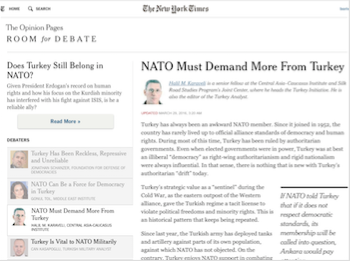Turkey’s strategic value as a “sentinel” during the Cold War, as the eastern outpost of the Western alliance, gave the Turkish regime a tacit license to violate political freedoms and minority rights. This is an historical pattern that keeps being repeated.
Since last year, the Turkish army has deployed tanks and artillery against parts of its own population, against which NATO has not objected. On the contrary, Turkey enjoys NATO support in combating “terrorism.” Under this pretext, the Turkish armed forces have destroyed several Kurdish cities in the southeast of the country, killing hundreds of civilians and forcing hundreds of thousands of people to flee.
It is a common mistake to attribute everything that has lately gone wrong in Turkey solely to President Erdogan. In fact, Erdogan has entered into an alliance with the military, which has regained much of its former power. Erdogan is executing policies that have been prescribed by the Turkish general staff. Turkey's meddling in Syria -- supporting diverse jihadist groups in order to check the Kurds -- is also fully in line with the nationalist, anti-Kurdish priorities of the Turkish military, and this policy is being conducted in concert between the civilian government and the military.
If Turkey continues to lay its Kurdish cities to rubble, it will become increasingly difficult to keep up the fiction that it belongs in NATO, to maintain that it embraces any of the democratic values that the Western alliance purports to stand for. But, Turkey’s NATO membership offers the alliance leverage. It’s only that Turkey has never before had to make a choice between continued NATO membership and authoritarian practices; it has always been able to have it both ways.
For once, NATO ought to try to influence Turkish policy in a liberal direction. Being isolated from the West is something that the Turkish regime fears. Therefore, if NATO were to tell Turkey that if it does not respect democratic standards, its membership will be called into question, Ankara is going to pay attention. Ultimately, the question is not so much “does Turkey belong in NATO” as “how much does NATO stand for the values that it is officially committed to?”
Halil M. Karaveli is a senior fellow at the Central Asia-Caucasus Institute and the Silk Road Studies Program.

 March 29, 2016
March 29, 2016

 What should be the United States’ strategy towards Central Asia, the Caucasus, and the region of Greater Central Asia (GCA) as a whole? Should it even have one? Unlike most other world regions, these lands did not figure in US policy until the collapse of the USSR in 1991. Though the new Baltic states entered Washington’s field of vision in that year, in those cases the Department of State could recall and build upon America’s relations with independent Estonia, Latvia, and Lithuania during the inter-war decades. For the US Government after 1991, GCA was defined less as sovereign states than as a group of “former Soviet republics” that continued to be perceived mainly through a Russian lens, if at all.
What should be the United States’ strategy towards Central Asia, the Caucasus, and the region of Greater Central Asia (GCA) as a whole? Should it even have one? Unlike most other world regions, these lands did not figure in US policy until the collapse of the USSR in 1991. Though the new Baltic states entered Washington’s field of vision in that year, in those cases the Department of State could recall and build upon America’s relations with independent Estonia, Latvia, and Lithuania during the inter-war decades. For the US Government after 1991, GCA was defined less as sovereign states than as a group of “former Soviet republics” that continued to be perceived mainly through a Russian lens, if at all.